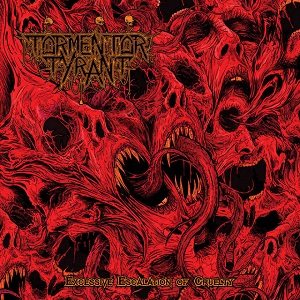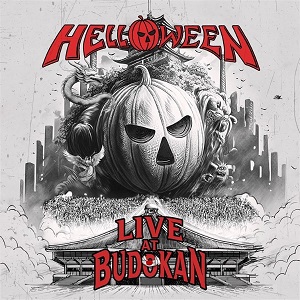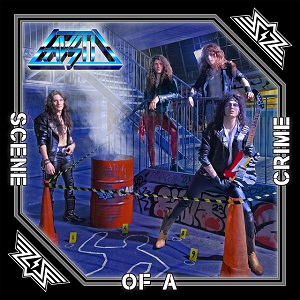EYEHATEGOD - Impure And Sacred
June 10, 2014, 10 years ago
Williams also suffers from asthma, yet the death of his bandmate didn’t make him look at life any differently. “Not really. I’m not one of those people that worries about my health that much – I probably should, but I don’t. Yeah, of course it makes you sit back and think for a minute… you never know what’s going to happen. The old, clichéd thing to say is, you might get hit by a bus tomorrow. I don’t really take care of myself as well as I should, and neither did he. I don’t think any of us really do. I don’t know man? It’s just one of those things… you’ve got to live your life. We can’t be scared to do things or scared to tour, you’ve got to go out and do it.”

All of the drumming heard on the new self-titled Eyehategod album is LaCaze. “We had recorded it a month or two before he passed away,” reveals Williams. “Some of the songs have been floating around for years.” Notably “The Age Of Bootcamp”, which appeared on Preaching The End-Time Message from 2005. “Even before that,” interjects Mike. “A lot of people don’t even know this, but that song came out on a split 7” with Soilent Green in 2003. It was a small pressing type thing, there was probably only 500 made at the most. Preaching The End-Time Message is just like a compilation.” So why give “The Age Of Bootcamp” another shot? “It’s a song we love to play live. We would always get people yelling that one out (at shows). So it was just one of those things. We went in the studio and we recorded 15 songs; we didn’t know what was going to go on the record. 11 made it, and the rest we’re going to do other things with. To me, ‘The Age Of Bootcamp’ sounds a lot better now than it did the first time around.”
The recently issued, self-titled EHG album arguably has the best sound of any release in the band’s catalogue. That being said, it doesn’t feature the slick production utilized by Whitesnake or Journey; however the clarity comes through. “I agree with you. For a band like us, it’s kind of hard to do ‘cause you don’t want it too clean, for obvious reasons. You don’t want it to sparkle, but at the same time, you want to make it a little better – the best you can be. We just wanted it to have a good production. We wanted people to hear the instruments and hear the vocals. We’re a lot better musicians now than we were back in the day (EHG released their debut, In The Name Of Suffering, in 1992) when we would just string something together. This album, we wanted people to pay attention to that.”

Initial work on the new album began with producer Billy Anderson, who helmed Dopesick back in 1996, yet they couldn’t complete the project together. “The consensus was that it wasn’t the right time to be doing a record. It wasn’t a difference of opinion; it was a difference of everybody’s mental state. Everybody was in their own world, doing their own thing. Some people were having personal problems and things like that were going on. Besides that, Billy had a documentary crew in there filming – it’s not like he hired them to come in and do it, these guys had been following him around for a few years, filming his life, what it’s like to be Billy Anderson. We didn’t even know! We show up at the studio and he’s got this documentary crew there, we’re like, what the fuck is this? We really didn’t want to have anything to do with that. We’re in there to make a record; we’re not in there to give a fuck about that. So that was real distracting and kind of pissed us off. But everybody was having problems. Billy was having trouble working with a couple people, it was a mess. Plus the fact that we were trying to do the entire record in like a week. We used to do that back in the day. We could record an album in three days live to tape and just fuckin’ put it out. But we don’t do that anymore. We try to be, I guess the word’s professional, about it; if that’s a word that can be used with us? We’re trying to do it right and get the tracks down, make sure everything’s flowing together properly.”
Producer Stephen Berrigan, and subsequently Pantera vocalist Phil Anselmo picked up the pieces. “Steve was always there. Steve was in the studio when we were with Billy. He’s an old friend of mine, of all of ours. He’s worked on Down records, he’s done a ton of local bands (in New Orleans). Once we decided to stop working with Billy, it was an obvious choice to go with Steve in our practice room, which is the same thing. We have a recording studio up there so it made sense.”
“New Orleans Is The New Vietnam” was released as a 7” vinyl single in September 2012, and is now seemingly impossible to find, albeit digital downloads are easy enough to come by. Mike explains why that song wasn’t included on the new album. “Cause we had just put it out. We’d done three pressings of the 7” with different covers and different coloured vinyl, the whole works. It’s actually going to come out again as a 7” picture disc, I don’t know when? We re-recorded it, but we left it off the record. It’s on the Japanese version, a brand new version of ‘Viet Nam’.”
Although it’s a brand new image adorning the Eyehategod album cover, the picture evokes a classic feel, fitting perfectly within the group’s visual repertoire. “It’s just a matter of people finding things, stuff in the public domain that we can use. Gary (Mader, bassist) found the majority of it and ran it by us 400 times until everybody decided what they wanted on there, what the border should look like, blah, blah, blah. It’s the same as we’ve always done. We’re still doing the cut and paste thing, but we put it through the computer so it looks a little cleaner than the older records which literally were cut and glued on with a glue stick, or taped on with Scotch tape.” Confederacy Of Ruined Lives, released in 2000, is a perfect example. “Yeah exactly, but I like that. I think that’s awesome. I’m glad you can see the tape. All of the old records are done like that – In The Name Of Suffering, Take As Needed For Pain – those are all cut and paste. I did all the old artwork by myself, and then Joey would add a lot to it. But lately it’s mostly been Gary; he’ll find the images and run ‘em by us.”
After all these years, why a self-titled album now? “To me, it just made perfect sense. It’s kind of a new beginning. Joey’s drums are on there, and now he’s gone, so it’s symbolic to me to call it Eyehategod. We had a list of titles we could have used. It easily could have been called Medicine Noose or Robitussin And Rejection – one of the song titles. We had talked about it before Joey died, and after he died it seemed obvious that’s what we should do with it.”
Undoubtedly the fans miss Joey, but they’ve really embraced new drummer Aaron Hill, formerly of Mountain Of Wizard and Missing Monuments. Given the tragic circumstances, the transition was surprisingly smooth. “There was an audition process, but Aaron wasn’t one of the people who auditioned. We auditioned some guys from out of town. I’m not going to mention any names just because I don’t want to even bring them into it; they were in bigger bands. Bands you read about that are touring bands, international bands. We did that and it was like, these guys aren’t going to be able to tour. We’re going to have to work our schedule around them. And besides that, nobody from out of state could play like Joey. Nobody’s got that southern groove; you’ve got to be from here (Louisiana) to have that feel. So Aaron was just a friend of ours, we’ve known him from the local scene for ages. We went through two people and Jimmy (Bower, guitarist) was like, ‘Trust me, Aaron’s the guy.’ Ok, cool. Besides being able to play the songs, you’ve got to be able to ride in a van with the guy and get along with the person. He fits right in with us.”

When he’s not mangling six strings in Eyehategod, Jimmy Bower plays drums in Down. A pair of bands that have endured lengthy dry spells without releasing any product whatsoever, yet new music from both camps surfaced in the month of May. “Right - and Crowbar’s album came out the same day as the Eyehategod record. It’s three of the biggest local bands putting out their records, I think it’s cool man. It brings a lot of attention to the city (New Orleans) and what we’ve got going on here.”
Eyehategod is only the fifth studio album for Williams and co., yet the band was formed in 1988 – that’s 26 years ago. Looking back, could they have been more productive? “No man, it is what it is. I don’t wish for anything. I don’t have any regrets – there’s personal things but as far as the band goes, no. The band is its own entity. What we’ve done is what we’ve done. A lot of people ask me in these interviews, ‘what’s it like to get back on the stage?’ I’m like, what the fuck are you talking about? We’ve been playing live constantly since… of course there were periods of ten months where we didn’t do anything, but we would always play local New Orleans at least. We’ve been to Europe tons of times. We’ve put out compilations, 7-inches. We’ve had other bands that have put records out. It’s not like we’ve been sitting around doing nothing; some people think that, I don’t know why.”

“Flags And Cities Bound” is a little different from the rest of the album as it features a spoken diatribe, in which Billboard Magazine is mentioned; completely unexpected. “I don’t even remember what I said to be honest. It was based on some stuff that I had written, but I just went off and changed it around. I don’t have any relationship with that magazine, I mean, if they put us in there now that would be cool. I’ve read the magazine before; it was one of those stream of consciousness things. I was just going with what was in my head at the time.” So if that song is played live, will it be different every time? “I have no idea; we never even thought about that. I don’t know. We’d have to talk about that. If we decided to do it live, I’m sure I would probably try to learn the lyrics from the record – or just do something totally different. Who knows?”
Mike’s lyrics have always been somewhat of an enigma; an element that draws certain people to the band, as much as it alienates others. Williams admits that writing in an ambiguous manner is definitely intentional. “Yes, because I like confusing people. That’s why we’re the masters of legalized confusion, as the song title says off of Dopesick. I like to contradict things; I like to stir things up. It’s very cryptic and abstract, it’s something different. Everybody wants to know exactly what you’re saying… it’s just a band, there’s no big statement here. I’m not trying to get a political point across or anything.”
Currently on tour across The United States (see Facebook for dates), don’t expect to see Eyehategod in Canada any time soon. “I keep telling people on Facebook, your country will not let us in. We would go there tomorrow if we could. I would fly up there right now, but we have criminal records. Unless somebody helps us figure out how to get in there, I don’t know. We’ve been dying to play there forever, since we started. We should have went back in the day, before we started getting in so much trouble. But we didn’t start actually touring ‘til ’93. If a promoter is reading this and wants to bring us up there, I guarantee it’ll be killer shows because we’ve never been there. We would just love to go there. They don’t take kindly to certain offences up there, especially from stupid Americans. Violence and drugs are not something they want. You have it in your country, but they don’t want us bringing it in I guess. They just exaggerate things and make it worse than it is.”











